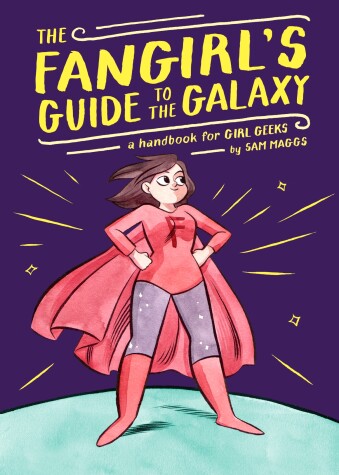Reviewed by Rinn on
I would definitely consider myself a fangirl. There are so many fandoms I’m a part of, whether they are books, films, television shows or video games. Therefore, a book that discussed all the wonderful parts of being a fangirl seemed pretty damn perfect to me. And according to The Fangirl’s Guide to the Galaxy, I am a Potterhead, a Whovian, a Tolkienite, a Bookwalker, a True Believer, a YA Book Nerd, a Whedonite and Girl Who Games – and I am PROUD to be all of those.
As a girl who plays a lot of online games, I have sadly encountered a lot of casual (and sometimes not so casual) sexism. And also a lot of disbelief – I distinctly remember playing one particular online game, and just sitting around chatting to my guild. I always tend to play female characters (normally with red hair!), but I have plenty of male friends who do the same and guys playing as female characters is pretty prevalent in the MMO (Massively Multiplayer Online) world. So I was innocently sat around and this guy just came up to me and said ‘So you’re one of those types then’. I asked him what he meant, and he responded with something along the lines of ‘Why the hell would a guy want to play as a female character, it’s so weird’. He had just assumed I was a guy playing as a female character, and by that reasoning ALL girls in the game were actually guys, because A GIRL PLAYING AN ONLINE GAME, THAT CAN’T HAPPEN. I then told him I was actually female and why did it even matter (because it’s a GAME, you can be whoever you want), and he proceeded to try and flirt with me. Nope. No. Not happening. And this is why I was happy to see a chapter on online gaming and how sometimes gender can unnecessarily and sadly have a negative impact on your experience.
There were plenty of other great themes: explaining the whole ‘otaku’ image and why you should avoid certain convention habits like glomping (ugh), a chapter on feminism and awesome women from various fandoms as well as some wonderful references that appealed to my nerdy self. BUT, and this was really quite a major issue, I honestly felt as if the author was just trying too hard to appeal to her audience. Overuse of slang made me cringe regularly and, despite the intended audience probably being girls in their mid-teens to early twenties, a lot of the book felt incredibly childish.
In addition, about three quarters of the book was really basic, self explanatory stuff. You’re going to pick this book up if you’re a fangirl of some kind, therefore you’ve probably already done most of the stuff the author gives advice on: attending conventions, using social media (yeah… really) and other things, most of which were really very dull to read about.
Overall, the book was fun in parts, but really really made me feel embarrassed for fangirls worldwide in others. The last quarter of the book was definitely the strongest – it would kind of be wrong to write a book like this without a chapter on feminism. This was something I greatly approved of, something I honestly feel we need a little more of in our science fiction and fantasy. Also, I’d like to thank the book for providing me with the knowledge that a letter from Georgiana, Duchess of Devonshire, to her mother, written in 1782, is probably the first recorded use of ‘feels’. Just imagining a duchess flailing around, whining about ‘her feels’ provides me with a great mental image!
Reading updates
- Started reading
- 1 April, 2015: Finished reading
- 1 April, 2015: Reviewed
